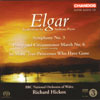Elgar Symphony No 3
Prosaic Elgar from Belgium while Hickox gives us two Payne realisations
View record and artist detailsRecord and Artist Details
Composer or Director: Edward Elgar
Genre:
Orchestral
Label: Chandos
Magazine Review Date: 2/2008
Media Format: Super Audio CD
Media Runtime: 70
Mastering:
Stereo
DDD
Catalogue Number: CHSA 5057

Tracks:
| Composition | Artist Credit |
|---|---|
| Symphony No. 3 |
Edward Elgar, Composer
BBC National Orchestra of Wales Edward Elgar, Composer Richard Hickox, Conductor |
| So many true princesses who have gone (Queen Alexa |
Edward Elgar, Composer
Adrian Partington Singers BBC National Orchestra of Wales Edward Elgar, Composer Richard Hickox, Conductor |
| Pomp and Circumstance March No 6 |
Edward Elgar, Composer
BBC National Orchestra of Wales Edward Elgar, Composer Richard Hickox, Conductor |
Author: Andrew Farach-Colton
Richard Hickox’s recording of the First Symphony (8/07) glosses over some details but compellingly conveys the music’s narrative thrust, at least, and the BBC NOW play with fierce conviction. Hickox is slightly less successful in Anthony Payne’s profoundly brilliant elaboration of the sketches for the unfinished Third Symphony. The very opening, for example, sounds somewhat flabby, especially compared with the gritty grandeur that Colin Davis evokes (LSO Live). The opening of the Scherzo is also rhythmically slack, weighing down the music’s gossamer-like texture, though Hickox takes off in the movement’s second part, where he gives an ardent lift to the sudden surges of nobilmente lyricism. And the interpretation comes into its own from there: the Adagio solenne is achingly intense, and the finale has ample swagger as well as a powerful feeling of tragic foreboding.
Hickox also gives us the premiere recording of Payne’s realisation of the Pomp and Circumstance March No 6. A distant cousin of the C minor March (No 3), it has a similar bite and dark insistence, yet is also more elusive harmonically and – frankly – less tuneful. As always, Payne’s preternatural understanding of Elgar’s style and sound world is astonishing. Hickox’s performance is authoritative, too, and his stately interpretation of the memorial ode So many true princesses who have gone (orchestrated by Payne) is stirring, though I prefer David Lloyd-Jones’s intimate, enraptured reading (Dutton, 5/05).
Discover the world's largest classical music catalogue with Presto Music.

Gramophone Digital Club
- Digital Edition
- Digital Archive
- Reviews Database
- Full website access
From £8.75 / month
Subscribe
Gramophone Full Club
- Print Edition
- Digital Edition
- Digital Archive
- Reviews Database
- Full website access
From £11.00 / month
Subscribe
If you are a library, university or other organisation that would be interested in an institutional subscription to Gramophone please click here for further information.




